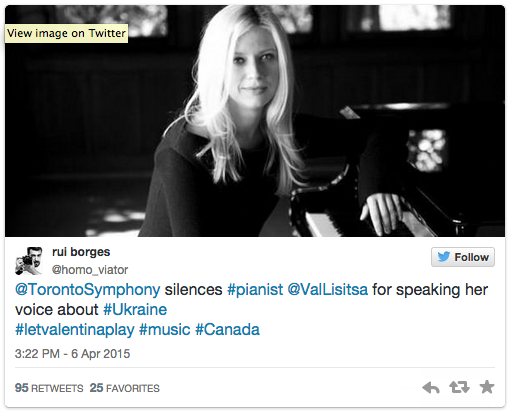Canada Continues To Lead The World In Naked Censorship
Canadian orchestra drops Ukraine-born pianist over anti-Kiev posts
RT.com
A Ukrainian-born pianist was barred from playing at Canada’s Toronto Symphony Orchestra (TSO) for expressing views on the situation in Ukraine via Twitter, according to the soloist herself. The move led to a social media storm tagged #LetValentinaPlay.
The orchestra has officially announced its decision to drop pianist Valentina Lisitsa from its Rachmaninoff Concerto #2 program earlier this week. TSO President and CEO Jeff Melanson cited “ongoing accusations of deeply offensive language by Ukrainian media outlets,” adding that Lisitsa’s “provocative comments” had allegedly “overshadowed past performances.”
In the statement, Melanson seems to be referring to Lisitsa’s Twitter posts, in which she expresses her views on the situation in Ukraine.
Lisitsa turned to Facebook on Monday with a plea, asking her fans for support to “tell Toronto Symphony that music can’t be silenced.”
“Someone in the orchestra top management, likely after the pressure from a small but aggressive lobby claiming to represent Ukrainian community, has made a decision that I should not be allowed to play,” she wrote, referring to her TSO performances on Wednesday and Thursday. “I don’t even know who my accusers are, I am kept in the dark about it.”
Lisitsa said she took to Twitter to shed some light on the other side of the story, “the one you never see in the mainstream media – the plight of my people, the good and bad things that were happening in Ukraine.”
Some of her work included translating Ukrainian-language websites and eyewitness accounts.
“I became really good in unmasking fakes published by Western media,” Lisitsa said.
Her statement also gives a brief summary on her actual views: “The worst thing that can happen to any country is fratricide war, people seeing each other, their neighbors as enemies to be eliminated …[a] Year later, we have the same rich people remaining in power, misery and poverty everywhere, dozens of thousands killed, over a million of refugees.”
After expressing her views, Lisitsa claimed to have received numerous death threats.
The last straw was the decision to drop her performance: “My haters didn’t stop there. Trying, in their own words, to teach me a lesson, they have now attempted to silence me as a musician.”
“They even threatened me against saying anything about the cause of the cancellation … If they do it once, they will do it again and again, until the musicians, artists are intimidated into voluntary censorship,” she wrote.
The reaction on Twitter was massive, with the hashtag #LetValentinaPlay surging in popularity and thousands of supporters speaking out.
International concert violinist and recording artist Hannah Woolmer tweeted: “To me, this IS a VITAL campaign pls can all my followers retweet if they agree that @TorontoSymphony should #letvalentinaplay.”
Seventy-two-year old Hana Ustohal wrote on Facebook: “What kind of monsters are in power of this country to make such an insane and sadistic decision to not allow you to play. I’ve cancelled my ticket for Wednesday concert.”
Twitter user Ike Hike warned that the TSO’s decision “looks bad,” adding: “Would you seek fame as silencing art for partisan politics and smear Canada? You should #letvalentinaplay.”
Lisitsa maintained on her Twitter account that she does not mix music with politics, and does not “preach” during performances. Her opponents, however, accused her of being a “Kremlin mouthpiece” and a “hate monger.”
Maria Kolos wrote on Facebook, supporting the TSO’s decision: “Thank you TSO for not tolerating this offensive Kremlin mouthpiece.” Mat Babyak also said: “Thank you for not giving a platform to a racist hate monger! Keep her out of Canada!”
Another user, Iryna Cimorelli, pointed towards a large number of Ukrainian immigrants when expressing her support for the TSO. “Toronto is full of Ukrainian immigrants who are true patriots of their county and they would never ever allow this woman to play on that stage after her propaganda speeches. Never!!! Good for them for kicking her out, she can play in [the] Kremlin now!!!”
Lisitsa has a substantial following on YouTube and Twitter. One of her most popular videos – Beethoven’s ‘Moonlight Sonata’ – has over 9 million views. Due to her successful online career, she is sometimes referred to as “the web’s favorite pianist.”
Lisitsa was born in Kiev into a Russian-Polish family. Her family came to the capital from Odessa, Ukraine. She immigrated to the US in the 1990s.
Her career was successfully launched through a YouTube channel, which now has received around 43 million visitors. Lisitsa now travels around the world performing classical pieces.
Separately, Lisitsa has been running a Twitter account under the nickname NedoUkraïnka (“sub-Ukrainian”), which she came up with after the Ukrainian Prime Minister Arseny Yatsenyuk published a statement calling the supporters of eastern Ukrainian militia forces “subhumans.”
Kiev launched a military operation in Donbass in the southeast of Ukraine last April after locals rejected the new coup-imposed authority in the capital and demanded more autonomy.
Since then, the death toll has climbed to over 6,000, as the conflict between the Ukrainian government and the self-proclaimed People’s Republics of Donetsk (DPR) and Lugansk (LPR) continues.
One of the major latest developments was the peace deal brokered on February 12 by Russia, France and Germany between the sides of the Ukrainian conflict, which led to a decrease in hostilities. The agreements were signed in the Belarusian capital, Minsk, and called for a ceasefire, the withdrawal of heavy weaponry and prisoner exchange.
However, some have criticized the lack of progress since the agreements were signed.
Russia’s Foreign Minister Sergey Lavrov said the political dialogue between Kiev and the rebels has not even started. The issues, “which were agreed in Minsk and aren’t at all implemented include amnesty, special status [for Donetsk and Lugansk], lifting of the economic blockade and the launch of the political process,” Lavrov said.


